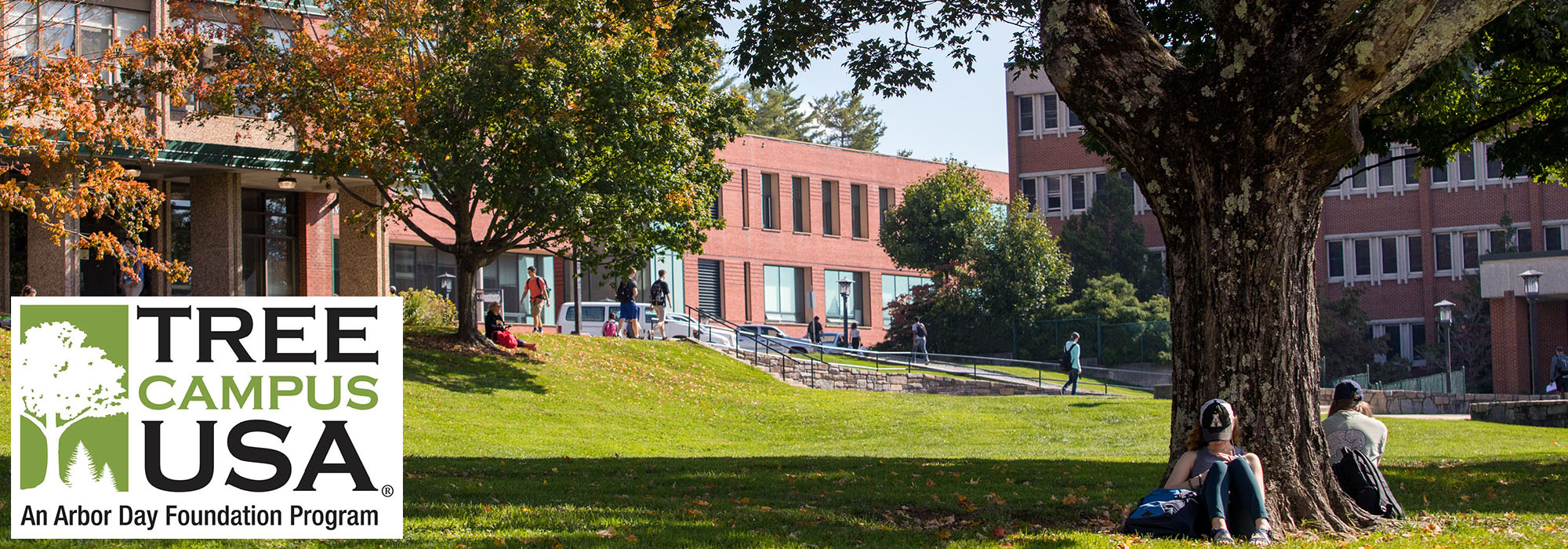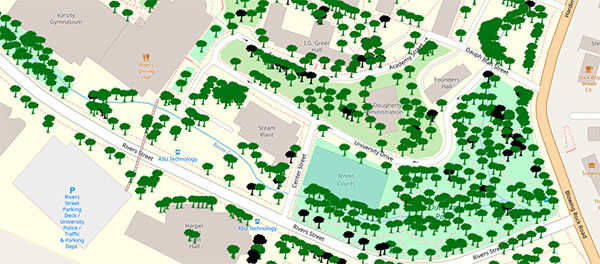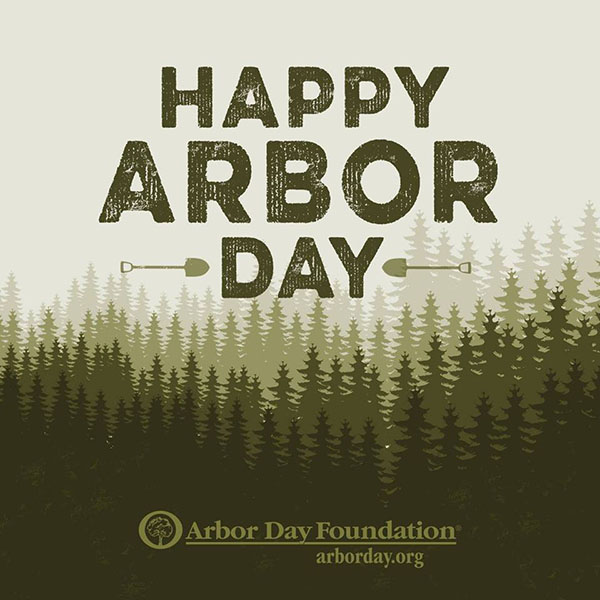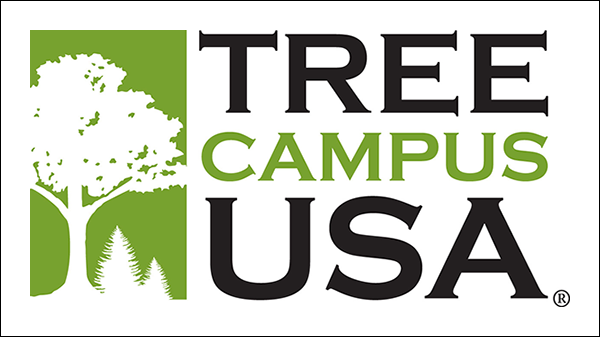BOONE, N.C. — The Arbor Day Foundation has again awarded Appalachian State University its Tree Campus USA distinction — a title the university has held since 2014.
The Tree Campus USA program recognizes higher education institutions and their leaders for promoting healthy trees and engaging students, faculty and staff in the spirit of conservation.
To honor its continued commitment to protecting and preserving trees, as well as the upcoming Arbor Day on Friday, April 26, the university will plant 25 new trees near Walker Hall as part of its Earth Month celebration. The tree species to be planted are dogwood, hawthorn, blue Atlas cedar, ginkgo, sweet gum, redbud, tulip poplar and bald Cyprus.
To obtain the Tree Campus distinction, Appalachian had to meet the five core standards for sustainable campus forestry required by the program:
- Establish a tree advisory committee.
- Present evidence of a care plan for campus trees.
- Dedicate annual expenditures for its campus tree program.
- Hold an Arbor Day observance.
- Sponsor student service-learning projects.
Additionally, Appalachian has joined the foundation’s new Time for Trees initiative, in which 5 million tree planters commit to plant 100 million trees in forests and communities worldwide by 2022 — the 150th anniversary of Arbor Day.
Appalachian arborist Chris Erickson said, “It’s so important that we are replacing trees on campus as well as adding to our inventory.”
He added, “The most important thing we have been doing in the last decade or so in regard to planting trees on campus is really considering everything that goes into having a long-lived tree. This includes all aspects of picking the right tree for the location, but also choosing the right planting locations that could host trees for long into the future.”
Dr. Mike Madritch, associate professor and assistant chair in the Department of Biology, shared several reasons for planting campus trees: Trees offer shade, help stabilize banks, supply shelter from wind and provide some carbon storage.
He said, “Over the years, Appalachian students, staff and faculty have planted hundreds of trees on campus. What’s most impressive to me is that they took the effort to plant those trees to benefit people 10, 20 or 30 years from now.
“Cutting trees is fast, but growing them takes a long-term commitment. In urban settings, trees need maintenance — a tree on a heavily trafficked university campus is not the same as a tree growing in a forest,” he added.
According to the foundation:
- 100 million trees can remove 578,000 tons of chemical pollution from the air, and forests provide 75% of Earth’s accessible fresh water by removing impurities and preventing erosion.
- A single tree can absorb 48 pounds of carbon dioxide annually to help regulate climate.
- Trees are a major pillar of the global economy. The timber sector generates $600 billion annually and 54.2 million jobs. Forests also contribute to the recreation and tourism industries.
Dan Lambe, president of the Arbor Day Foundation, said, “It can be easy to take trees for granted, but they are absolutely critical to maintaining balance on our planet — supporting clean air and water, healthy food and a livable climate.”
What do you think?
Share your feedback on this story.
The university celebrates with sustainable practices and strengthened resiliency
About Sustainability and Energy Management at App State
Appalachian State University’s leadership in sustainability is known nationally. The university’s holistic, three-branched approach considers sustainability economically, environmentally and equitably in relationship to the planet’s co-inhabitants. The university is an active steward of the state’s interconnected financial, cultural and natural resources and challenges students and others think critically and creatively about sustainability and what it means from the smallest individual action to the most broad-based applications. The university offers both undergraduate and graduate academic degree programs that focus on sustainability. In addition, 100 percent of Appalachian’s academic departments offer at least one sustainability course or course that includes sustainability, and all students graduate from programs that have adopted at least one sustainability learning outcome. Learn more at https://appstate.edu/sustainability.
About App State's New River Light and Power
For 110 years, New River Light and Power (NRLP) — a nonprofit electric utility operated by Appalachian State University — has provided reliable power to residents of Western North Carolina. The utility currently serves approximately 9,000 residential and commercial customers in and around Boone, including the university. NRLP is dedicated to expanding access to higher education, contributing approximately $650,000 annually to the university’s general scholarship fund. Additionally, the utility awards NRLP scholarships to support graduating Watauga County high school seniors pursuing an App State education, as well as those interested in pursuing a career in linework. NRLP holds the American Public Power Association’s Reliable Public Power Provider and Smart Energy Provider designations, recognizing its commitment to safety, efficiency, renewable energy and environmental stewardship. Learn more about App State’s New River Light and Power at https://nrlp.appstate.edu.
About the Department of Biology
The Department of Biology is a community of teacher-scholars, with faculty representing the full breadth of biological specializations — from molecular genetics to landscape/ecosystem ecology. The department seeks to produce graduates with sound scientific knowledge, the skills to create new knowledge, and the excitement and appreciation of scientific discovery. Learn more at https://biology.appstate.edu.
About the College of Arts and Sciences
The College of Arts and Sciences (CAS) at Appalachian State University is home to 17 academic departments, two centers and one residential college. These units span the humanities and the social, mathematical and natural sciences. CAS aims to develop a distinctive identity built upon our university's strengths, traditions and locations. The college’s values lie not only in service to the university and local community, but through inspiring, training, educating and sustaining the development of its students as global citizens. More than 6,800 student majors are enrolled in the college. As the college is also largely responsible for implementing App State’s general education curriculum, it is heavily involved in the education of all students at the university, including those pursuing majors in other colleges. Learn more at https://cas.appstate.edu.
About Appalachian State University
As a premier public institution, Appalachian State University prepares students to lead purposeful lives. App State is one of 17 campuses in the University of North Carolina System, with a national reputation for innovative teaching and opening access to a high-quality, cost-effective education. The university enrolls more than 21,000 students, has a low student-to-faculty ratio and offers more than 150 undergraduate and 80 graduate majors at its Boone and Hickory campuses and through App State Online. Learn more at https://www.appstate.edu.
















